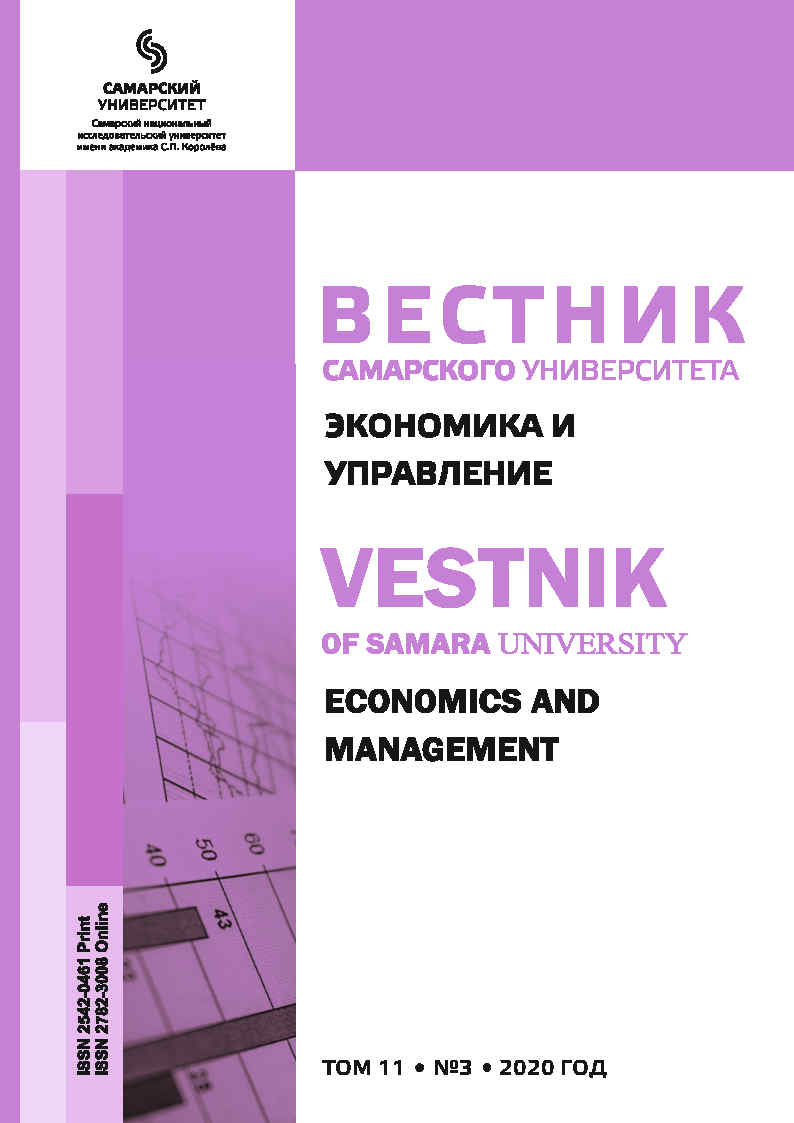ESSENTIAL CHARACTERISTICS OF «LIBERATED LABOUR» IN MODERN SCIENTIFIC RESEARCH
- Authors: Grudina S.I.1
-
Affiliations:
- Kazan Federal University
- Issue: Vol 11, No 3 (2020)
- Pages: 132-138
- Section: HUMANE RESOURCES MANAGEMENT
- URL: https://journals.ssau.ru/eco/article/view/8145
- DOI: https://doi.org/10.18287/2542-0461-2020-11-3-132-138
- ID: 8145
Cite item
Full Text
Abstract
The labor market is an important indicator of economic development. The primary task of modern scientific research is to find a solution to the issues of development of social and economic well-being in a transformational economy, as the phase of changes and rethinking of experience affects almost all spheres of human activity. The attitude that one has towards their work is also being reconsidered. Human labour is being more and more replaced by machine labour, robotics is being introduced, different processes are automated, digitalized. All this reflected in the qualitative and semantic component of labour, which acquires the features of «liberated labour» from the «alienated labour», according to the theory of Karl Marx, where the boundaries between the worker and resting time are being erased. Nowadays the progress in the field of digital and computer technologies of the industrial sector is carried out at a high speed and leads to the inability of functioning by the old principles of «saving on creativity». Scientific novelty of the research work is presented in the theoretical formation of the category «liberated» labour. Thу author addresses the essential characteristics of the category of «liberated labour», analyzes the classification of labour as a category of economics, reveals the prospects for the development of the category of «alienated» and «liberated» labour, takes the gender specifics and modern realities of socio-economic transformations into the account; the author developed a set of theoretical provisions, methodological approaches and practical recommendations for the formation of an environment of «liberated labour». The theoretical and methodological issues of the intensifying usage of liberated labour are applying the effect of the entirety and are presented by supplementing in the field of terminological apparatus by the author's concept of «liberated labour». The contours of innovative reproduction are substantiated, they are proposed to be formed on the basis of the creation of institutions for the regulation and standardization of work of a new generation, the opening of researching laboratories that study labour activity.
About the authors
Svetlana I. Grudina
Kazan Federal University
Author for correspondence.
Email: switki@yandex.ru
сandidate of Economic Sciences, assistant professor of the Department of Corporate Finance Management
Russian FederationReferences
- Ministry of Labor of the Russian Federation: оfficial website: https://mintrud.gov.ru/ministry/programms/inform. (In Russ.)
- Grudina S.I. Labor-market under globalization and international competitiveness. Actual Problems of Economics and Law, 2011, no. 3, pp. 14–15. Available at: https://cyberleninka.ru/article/n/rynok-truda-v-usloviyah-globalizatsii-i-mezhdunarodnaya-konkurentosposobnost. (In Russ).
- Genkin B.M. Labor economics: textbook. Moscow: Norma: INFRA-M, 2014, pp. 21–22. (In Russ.)
- Genkin B.M. Foundations of economic theory and methods of organizing effective work. 2nd edition, revised and enlarged. Moscow: Norma, 2011, pp. 180–181. (In Russ.)
- Grudina S.I. Modern paradigm of innovative activity efficiency and the competitiveness of Russian enterprises. Actual Problems of Economics and Law, 2012, no. 2, pp. 27–28. DOI: http://doi.org/10.21202/1993-047X.06.2012.2.26-29. (In Russ.)
- Kukushkin S.N. Labor in the information society. Transformation of labor into creativity. Economics of knowledge: theory and practice, 2017, no. 3, pp. 35–50, p. 35. Available at: https://www.elibrary.ru/item.asp?id=30549964. (In Russ.)
- Piketty T. Capital in the Twenty-First Century. Moscow: Ad Marginem Press, 2016, 592 p. (In Russ.)
- Bezrukova A.I. «The End of Work» as a Transformation of the Sphere of Work in the Modern Society. Science and School, 2013, no. 2, pp. 161–165. Available at: https://cyberleninka.ru/article/n/konets-truda-kak-transformatsiya-prostranstva-truda-v-sovremennom-obschestve. (In Russ.)
- Gaponenko A.L., Orlova T.M. Knowledge management. How to turn knowledge into capital. Moscow: Eksmo, 2008, 400 p. (In Russ.)
- Kotsoeva V.A. Fundamentals of formation and functioning of labor market in the context of socio-economic transformation (aspects of wages and employment): Candidate's of Economic Sciences thesis. Moscow, 2003, 178 p. Available at: https://www.dissercat.com/content/osnovy-formirovaniya-i-funktsionirovaniya-rynka-truda-v-usloviyakh-sotsialno-ekonomicheskoi. (In Russ.)
- Decree of the President of the Russian Federation «On national goals and strategic objectives of the development of the Russian Federation for the period up to 2024» dated May 7, 2018, no. 204. Available at: http://bit.samag.ru/uart/more/67maintitle (accessed 10.05.2018). (In Russ.)
- Dezhina I. «Leading universities» or «research universities»?. Vysshee Obrazovanie v Rossii = Higher Education in Russia, 2004, no. 8, pp. 9–17. Available at: https://www.elibrary.ru/item.asp?id=9573829. (In Russ.)
- Decree of the President of the Russian Federation dated January 16, 2017 № 13 «On Approval of the Fundamentals of State Policy for Regional Development of the Russian Federation for the Period until 2025». Access from legal reference system «ConsultantPlus». Available at: https://constitution.garant.ru/act/federative/71587690. (In Russ.)
- Russia 2025: from personnel to talents. Available at: https://www.bcg.com/ru-ru/perspectives/188095 (accessed 25.12.2019). (In Russ.)
- Tyukavkin N.M., Kurnosova E.A. Theoretical approaches to the study of «infrastructure support of innovation activity» category. Russian Journal of Innovation Economics, 2019, vol. 9, no. 4, pp. 1329–1340. DOI: http://doi.org/10.18334/vinec.9.4.41323. (In Russ.)
- Zemtsov S.P. (Ed.) National report «High-tech business in the regions of Russia». 2020. Moscow: RANKhiGS, AIRR, 2020, 100 p. Available at: https://www.researchgate.net/publication/338955368_
- Nacionalnyj_doklad_Vysokotehnologicnyj_biznes_v_regionah_Rossii_(In Russ.)
Supplementary files









